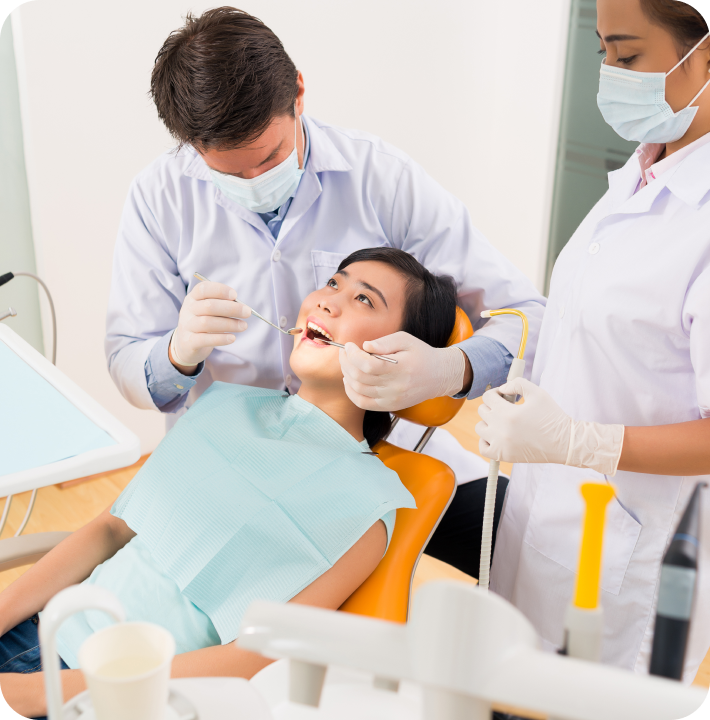Maintain Your Oral Health With Dental Checkups
Discover the benefits of routine dental checkups to maintain your oral health and prevent dental issues. Experience personalised care for a bright, healthy smile.

The Role of Dental Checkups in Protecting Your Long-Term Oral Health
Many overlook the importance of regular dental checkups, resulting in undetected issues that can escalate into serious oral health problems. Neglecting routine visits may result in cavities, gum disease, and complications that impact oral health and overall well-being.
By prioritising dental checkups, dentists can detect potential problems early, and patients can receive tailored advice for maintaining optimal oral health. This proactive approach promotes not only a healthier smile but also a better quality of life for years to come.

Candidate Eligibility for Dental Checkups to Maintain Long-Term Oral Health
Dental checkups are essential not only for patients experiencing pain or dental issues but for everyone aiming to maintain optimal oral health. Several factors influence the frequency of these checkups, determining who may benefit from more frequent visits.
- Age:
Regular dental checkups are essential for individuals of all ages, from children to seniors, to monitor oral health changes. - Medical History:
Patients with a history of dental issues, chronic illnesses, or ongoing treatments should prioritise checkups for tailored care. - Lifestyle:
Smokers and those with high-sugar diets are at risk of dental problems and should schedule more frequent visits. - Symptoms:
Pain, bleeding gums, or other oral health concerns require immediate dental attention.
Explore the Benefits of Regular Dental Checkups for Your Smile
Regular dental checkups offer numerous benefits that contribute to a healthy, radiant smile. This list highlights key advantages, emphasising how routine visits can enhance your oral health and well-being.
- Early Detection:
Regular checkups help identify dental issues, such as cavities and gum disease, before they escalate into serious problems. - Preventive Care:
Routine visits allow for professional cleanings and treatments, reducing the risk of dental issues. - Personalised Advice:
Dentists provide tailored guidance on oral hygiene practices and dietary choices to enhance dental health. - Overall Health:
Maintaining oral health through checkups positively impacts general health, reducing the risk of systemic diseases.

Schedule Your Consultation Today
Experience Exceptional Dental Treatments for a Healthier, Brighter Smile

Frequently Asked Questions
This section addresses commonly asked questions regarding dental checkups, providing clarity on their importance and what to expect during appointments.
How often should I schedule a dental checkup?
Regular dental checkups are essential for maintaining optimal oral health and preventing potential dental issues. Below is a detailed guide on how often you should schedule a dental checkup:
- General Recommendation:
Most dentists recommend scheduling a routine dental checkup at least every six months. This frequency helps maintain optimal oral health and allows for early detection of potential issues. - Individual Factors:
- Age:
Children and seniors may need more frequent checkups due to changing dental needs. - Medical History:
Individuals with a history of gum disease, cavities, or other dental issues may need checkups every three to four months to monitor their condition. - Lifestyle:
Smokers or those with high sugar diets should consider more frequent visits to manage increased risks of dental problems.
- Age:
- Signs of Issues:
If you experience tooth pain or persistent bad breath, schedule a checkup promptly, regardless of your routine. - Preventive Care:
Regular checkups help maintain dental health by reducing the risk of systemic diseases linked to poor oral hygiene.
Regular checkups help maintain a healthy smile and catch potential dental issues early, preventing more serious problems. Always consult your dentist for personalised oral health advice. If you’re looking for dental checkups in Inglewood, contact us today.
What happens during a routine dental checkup?
During a dental examination, several key steps are involved to confirm that your teeth and gums are healthy. Recognising the importance of dental checkups helps you stay proactive about your oral health. Here’s a breakdown of what to expect during a dental checkup:
- Patient History Review:
The dentist reviews your dental history, noting any changes since your last visit and discussing any current health issues. They will conduct a thorough oral health examination, checking for signs of decay and other abnormalities. - X-rays:
If required, dental X-rays may be taken to identify issues not visible during the visual exam. This includes cavities between teeth or problems with the jawbone. - Oral Cancer Screening:
The dentist may conduct an oral cancer screening to check for unusual lumps, lesions, or other signs of oral cancer. - Discussion of Findings:
After the examination, the dentist discusses findings, including any concerns and recommendations for treatment strategies if necessary. - Preventive Advice:
The dentist provides personalised advice on oral hygiene practices and any additional preventive measures to maintain your oral health. - Scheduling Next Appointment:
Before leaving, you may schedule your next routine checkup, usually recommended every six months.
Understanding the importance of dental checkups and what happens during a routine visit helps patients feel more comfortable. This builds confidence in maintaining their oral health through regular dental visits.
How can dental checkups help prevent oral health problems?
Routine dental checkups are important for maintaining oral health and preventing issues, as they help identify and address potential problems early. Here’s how dental checkups contribute to preventing oral health problems:
- Early Detection of Cavities and Tooth Decay:
Dentists use X-rays during an oral health examination to detect tooth decay that may not be visible to the naked eye. Early cavity treatment prevents tooth decay from worsening, lowering the need for invasive procedures such as fillings or root canal treatments. - Personalised Oral Hygiene Guidance:
Dentists can assess individual dental hygiene practices and provide tailored recommendations to improve at-home care and help prevent future issues. - Assessment of Risk Factors:
Dentists evaluate lifestyle habits (such as diet and smoking) that may contribute to oral health issues and provide strategies to mitigate these risks. - Education on Oral Health:
Dental checkups offer patients an opportunity to learn about the importance of oral health, fostering preventive practices.
A routine dental checkup helps protect oral health by detecting potential issues early and providing professional advice.
What should I do to prepare for a dental checkup?
Preparing for a dental checkup maximises your visit and helps your dentist provide effective treatment tailored to your needs. Here’s a detailed guide on what you should do before your appointment:
- Brush and Floss Thoroughly:
Clean your teeth, gums, and tongue before the oral health examination. Doing so will remove food particles and plaque, making it easier for the dentist to examine your teeth and gums. - Make a List of Your Symptoms or Concerns:
Write down any discomfort, pain, or changes you’ve noticed in your mouth, like sensitive teeth, bleeding gums, or difficulty chewing. Listing these concerns to be discussed with your dentist helps prevent any issues from going unnoticed. - Bring a List of Current Medications:
Include prescription drugs, supplements, and over-the-counter medications. Knowing what you are taking helps your dentist understand your overall health, as some medications can impact oral health. - Update Your Medical History:
Inform the dentist of any recent surgeries, chronic health conditions, or allergies. This allows the dentist to take appropriate precautions during your treatment. - Avoid Eating Right Before the Appointment:
Avoid having a large meal within an hour of your checkup. This will make the exam more comfortable. - Be Ready to Share Your Dental Routine:
Be honest about how often you brush and floss. This helps your dentist provide tailored advice to improve your dental care routine. - Bring Relevant Dental Records if You’re a New Patient:
If you’ve had recent X-rays, scans, or treatments at another clinic, bring copies of your records. This information can provide valuable insight and save time. - Prepare Any Dental Health Fund Information:
Have your dental health fund details or payment information ready. This can help streamline the administrative process and avoid delays.
These steps help make your routine dental checkup smoother and more efficient, allowing your dentist to provide optimal care.
How long does a dental checkup take?
Dental checkup durations vary based on individual oral health and specific needs. Here’s a table of what contributes to this timeframe:
| Checkup Stage | Timeframe | Description |
| Introductory Consultation | 5-10 minutes | The dentist will review your medical and dental history. They will also discuss your current dental concerns or symptoms you may be experiencing. |
| Thorough Oral Examination | 10-15 minutes | The dentist checks the teeth, gums, and soft tissues for signs of decay, gum disease, and other issues. If required, X-rays may be taken, adding 5 to 10 minutes to the appointment. |
| Final Consultation and Recommendations | 10-15 minutes | The dentist discusses their findings, offers maintenance advice and outlines your treatment plan. After which, the treatments may be scheduled. |
This table shows an overview of the time involved in a standard dental checkup. It usually takes 20 to 40 minutes, depending on individual needs and any extra procedures required.
What dental issues can be detected during a checkup?
A dental checkup lets your dentist detect potential dental issues early, even before they become visible or symptomatic. Routine checkups are essential for early detection and intervention, helping prevent minor concerns from turning into major problems. Below are some of the common dental issues that can be detected during a routine checkup:
- Plaque and Tartar Buildup:
Dentists check for areas of plaque accumulation, which can result in cavities or gum disease if not addressed. Tartar, a hardened plaque, cannot be removed through regular brushing and requires professional cleaning. - Tooth Decay (Cavities):
Dentists can identify early signs of tooth decay, even before they become visible to the naked eye. Small cavities are often detected through visual inspection, x-rays, or other special tools. Early intervention prevents the need for more invasive treatments like fillings or crowns. - Tooth Wear and Erosion:
Signs of tooth wear include wear facets or flattened restorations. Tooth wear is usually caused by habits like teeth grinding (bruxism) or acidic erosion from diet or medical conditions. Identifying the cause early allows preventive measures to protect the teeth. - Bite and Jaw Issues (Malocclusion):
Dentists assess the alignment of your teeth and bite to identify any issues with occlusion (the way teeth meet). Detecting problems early can help prevent jaw pain, tooth wear, and other complications. - Teeth Alignment Concerns:
Dentists monitor the development of teeth in children and adults, checking for crowding, spacing, or misalignment issues. Identifying issues early allows for timely orthodontic treatment if necessary. - Oral Cancer:
Dentists conduct an oral cancer screening by examining the tongue, throat, lips, and soft tissues of the mouth. Early signs include unusual lumps, discoloured patches, or sores that don’t heal. Detecting oral cancer in its initial stages can significantly improve treatment outcomes.
The importance of dental checkups lies in their ability to catch potential issues early before they develop into more serious problems. Regular visits allow for the timely detection of dental concerns and reduce the need for extensive treatments. If you have a dental emergency, don’t wait—contact our dental clinic for prompt, professional care.
What is the cost of a dental checkup?
Several factors can influence the cost of a dental checkup, including the following:
- Location:
Dental fees can vary widely depending on where the dental office is located. Practices in urban areas or regions with a higher cost of living may charge more compared to those in rural areas or locations with a lower cost of living. - Dentist’s Experience and Reputation:
The experience and reputation of the dentist can also affect the cost. Highly experienced or specialised dentists may charge more for their dental services compared to those with less experience. - Type of Checkup:
The specific components of the checkup can greatly influence the cost.- Routine Checkup:
A basic examination might involve just a visual inspection and professional cleaning. - Comprehensive Checkup:
This can include more extensive evaluations, such as a periodontal exam, oral cancer screening, or other diagnostic procedures. - X-rays:
If X-rays are necessary, they can add to the total cost, depending on the type and number of images required.
- Routine Checkup:
- Additional Services:
Some checkups might include or require additional procedures like fluoride treatment, scaling and polishing, or sealants. Each of these can increase the total cost. - Health Fund:
Health funds can significantly reduce out-of-pocket costs for a checkup. Depending on the policy, they may cover all or a portion of the exam, cleaning, and other preventive services. Without health funds, patients are responsible for the full cost.
Azure Dental offers a comprehensive dental checkup package for $249 or gap-free, which includes a detailed dental examination, X-rays, scans, and a scale and clean. This offer is an excellent way to prioritise your oral health by getting a full checkup at a competitive price. This package allows you to receive essential preventive care while managing your costs effectively.
How can I maintain my oral health between checkups?
Maintaining good oral health between dental checkups is essential to preventing common dental issues. Adopting a few daily habits can keep your teeth and gums healthy while lowering the risk of dental problems. Here are some strategies to help you maintain optimal oral health between your routine checkups:
- Brush Your Teeth Twice a Day:
Use a soft-bristled toothbrush and fluoride toothpaste. Brush for at least two minutes, covering all tooth surfaces, including the back teeth. Replace your toothbrush every three to four months or sooner if the bristles become frayed. - Floss Daily:
Flossing helps remove plaque and food particles from areas your toothbrush can’t reach. Use about a foot of floss, wrap it around your fingers, and gently guide it between each tooth. Alternatively, you may use a water flosser or interdental brushes. - Limit Sugary and Acidic Foods:
Minimise consumption of sugary snacks and acidic beverages like sodas and citrous fruits. Sugar can contribute to plaque buildup and cavities, while acidic food can erode your enamel over time. - Avoid Tobacco Products:
Smoking or using tobacco products increases the risk of gum disease, tooth discolouration, and oral cancer. Consider seeking support to quit smoking to protect your oral and overall health. - Wear a Mouthguard for Night Grinding:
If you grind your teeth at night (bruxism), wearing a custom mouthguard can prevent tooth damage and alleviate jaw pain. Talk to your dentist about options for protecting your teeth if you suspect grinding. - Schedule Regular Professional Cleanings:
Have your dental checkup every six months to catch any early signs of dental issues. Professional cleanings help remove tartar and plaque buildup that cannot be removed by regular brushing and flossing alone.
With continuous support from our dedicated team, adding these habits to your routine keeps your teeth healthy.